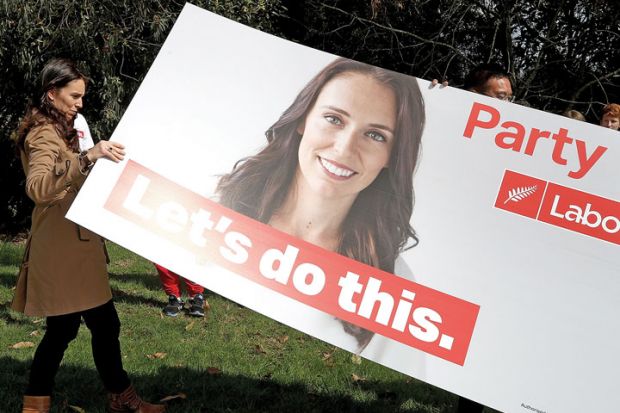New Zealand’s abolition of tuition fees faces its first electoral test after prime minister Jacinda Ardern called a general election, but both her Labour Party and the opposition National Party are thought to be nervous about campaigning strongly on the issue.
While the free tuition policy was seen as helping to have propelled Ms Ardern to power in the 2017 poll, both major parties may fear igniting a backlash if they try to make electoral capital out of it.
Universities New Zealand executive director Chris Whelan said that although the abolition of fees did not necessarily “drive a lot of voter behaviour”, there would be “a major downside to discontinuing it”.
Critics say the scheme, which removed fees for first-year tertiary students, has failed to increase participation or improve education quality and has absorbed money better spent elsewhere. Consultant Roger Smyth, a former head of tertiary education policy in New Zealand’s education ministry, said the programme was widely considered regressive, poorly targeted and “a bit of a fizzer”.
He cited doubts that Labour would extend the scheme to second-year students after the election, as originally pledged, with finance minister Grant Robertson last year suggesting that the plan was being reconsidered.
“The loss of faith politically of not doing stage two would be considerable,” Mr Smyth said. “The government is on a bit of a hiding to nothing.”
University of Canterbury political scientist Ann Brower said the abolition of fees would feature in the election as an “upper middle-class subsidy” that had not significantly boosted student numbers or injected cash into New Zealand’s financially struggling polytechnics.
But government relations consultant Neale Jones, who helped develop the policy as Ms Ardern’s chief-of-staff, said it had been misrepresented as a “bums on seats” policy when it was really about reducing student debt.
“Given that it hasn’t played as well in the media as they would have liked, does the government continue as planned with a second year of free education? Or do they reassess? As the election campaign heats up people will want to know,” he said.
Labour’s coalition partner, the Greens, support free tuition and also want to reverse the 2014 removal of student allowance for postgraduates – something Labour promised before the 2017 election but has not fulfilled.
Mr Jones said that the National Party also faced a difficult choice. While it had exploited free tuition as a “useful rhetorical tool to talk about wasteful government spending”, it would court danger if it tried to scrap the scheme. “They’ll want to continue to paint fees-free as a mistake, but they’ll need to find a clever way to retool it so students don’t lose out,” he said.
An “education discussion document”, released in November, flags options under National’s consideration. They include narrowing access to the fee exemption, applying it to final-year rather than first-year study, contributing to family education savings accounts, writing off loans for student living expenses and raising the repayment threshold or reducing the repayment rates for student loans.
Mr Smyth said the opposition was “road-testing ideas” that were mostly regressive, expensive or technically complex, while simultaneously courting headlines.
Register to continue
Why register?
- Registration is free and only takes a moment
- Once registered, you can read 3 articles a month
- Sign up for our newsletter
Subscribe
Or subscribe for unlimited access to:
- Unlimited access to news, views, insights & reviews
- Digital editions
- Digital access to THE’s university and college rankings analysis
Already registered or a current subscriber? Login








